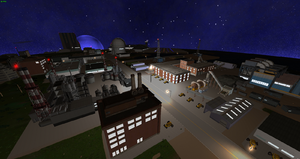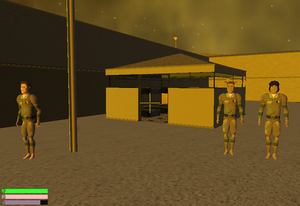City: Difference between revisions
(→Jurisdiction: Bigger jurisdictions.) |
(Removed old-style information.) |
||
| Line 2: | Line 2: | ||
| Update = [[Building Update]] | | Update = [[Building Update]] | ||
}} | }} | ||
[[file:CityDowntown.png|thumb|right|A neatly built downtown area of a city.]] | [[file:CityDowntown.png|thumb|right|A neatly built downtown area of a city.]] | ||
[[Building]]s can be left independent and function just fine on their own, but there are advantages to making them into a city. Cities are formed when a [[capitol]] and a [[Police_Station|police station]] are built. | [[Building]]s can be left independent and function just fine on their own, but there are advantages to making them into a city. Cities are formed when a [[capitol]] and a [[Police_Station|police station]] are built. | ||
| Line 21: | Line 20: | ||
For more information, see the [[Claim]] page. | For more information, see the [[Claim]] page. | ||
=Morale= | ==Morale== | ||
The [[morale]] of a city's population determines if population is immigrating or emigrating. When morale is zero or positive, population will try to immigrate into the city. When morale is negative, the population will emigrate out of the city. | The [[morale]] of a city's population determines if population is immigrating or emigrating. When morale is zero or positive, population will try to immigrate into the city. When morale is negative, the population will emigrate out of the city. | ||
For more information, see the [[City_Morale]] page. | For more information, see the [[City_Morale]] page. | ||
=Loyalty and | ==Loyalty and Neglect== | ||
{{Revision|Loyalty and neglect is not implemented for new-style cities of the [[Building Update]] yet.}} | |||
<s>Loyalty of city population tends to increase in favor of the owner of the city, at the rate of one citizen per report cycle. | |||
Loyalty of city population tends to increase in favor of the owner of the city, at the rate of one citizen per report cycle. | |||
[[Neglect]] begins 14 days after a city was last visited by its empire. A city is considered to be visited whenever an officer or avatar, of its empire, is present in the city's solar system for at least one minute. A city is also considered visited when it receives tribute from another city. | [[Neglect]] begins 14 days after a city was last visited by its empire. A city is considered to be visited whenever an officer or avatar, of its empire, is present in the city's solar system for at least one minute. A city is also considered visited when it receives tribute from another city. | ||
| Line 54: | Line 35: | ||
When the loyalty of the population is at zero and their morale is below zero, they will revolt. | When the loyalty of the population is at zero and their morale is below zero, they will revolt. | ||
For more information, see the [[City_Neglect]] page. | For more information, see the [[City_Neglect]] page.</s> | ||
=Abandonment Decay= | ==Abandonment Decay== | ||
Cities [[decay]] to remove unused and unwanted data from the game. Limited server resources require that unused things be removed, for the benefit of those things that matter to active players. | {{Revision|Abandonment decay is not implemented for new-style cities of the [[Building Update]] yet.}} | ||
<s>Cities [[decay]] to remove unused and unwanted data from the game. Limited server resources require that unused things be removed, for the benefit of those things that matter to active players. | |||
For information, read the [[City_Abandonment]] and [[Decay#City_Decay|Decay]] pages. | For information, read the [[City_Abandonment]] and [[Decay#City_Decay|Decay]] pages.</s> | ||
=Citizen DNA= | ==Citizen DNA== | ||
[[file:DnaMixedCitizens.png|thumb|right|A mix of [[Phylum|glabrian]] [[citizen]]s.]] | [[file:DnaMixedCitizens.png|thumb|right|A mix of [[Phylum|glabrian]] [[citizen]]s.]] | ||
Revision as of 19:12, 10 October 2018
| This page contain information about a feature that has two versions.
To read about the old version, go to City/OldVersion. For more information, go to the Building Update page. |

Buildings can be left independent and function just fine on their own, but there are advantages to making them into a city. Cities are formed when a capitol and a police station are built.
Cities allows the construction of banks, declaring of capitals, increased population migration, easier management and creation of city reports.
Jurisdiction
A city controls the jurisdiction area created by its police stations. Empires are blocked from constructing any buildings inside the jurisdiction of another empire's city.
The size of the jurisdiction depends on the police station building design used. The jurisdiction area of a city can be further extended by building more police stations.
City Control
When a capitol and a police station is built, all buildings inside the jurisdiction area will change ownership to that of the capitol building.
World Claim
When a world is claimed, all cities and buildings on the world will change ownership to that of the claim.
For more information, see the Claim page.
Morale
The morale of a city's population determines if population is immigrating or emigrating. When morale is zero or positive, population will try to immigrate into the city. When morale is negative, the population will emigrate out of the city.
For more information, see the City_Morale page.
Loyalty and Neglect
| This section is in need of revision. Please help improve it or discuss these issues on the talk page. The reason given is: Loyalty and neglect is not implemented for new-style cities of the Building Update yet. |
Loyalty of city population tends to increase in favor of the owner of the city, at the rate of one citizen per report cycle.
Neglect begins 14 days after a city was last visited by its empire. A city is considered to be visited whenever an officer or avatar, of its empire, is present in the city's solar system for at least one minute. A city is also considered visited when it receives tribute from another city.
Once the population feels neglected, loyalty decreases by one at each city report cycle, instead of increasing by one, until it reaches zero.
When the loyalty of the population is at zero and their morale is below zero, they will revolt.
For more information, see the City_Neglect page.
Abandonment Decay
| This section is in need of revision. Please help improve it or discuss these issues on the talk page. The reason given is: Abandonment decay is not implemented for new-style cities of the Building Update yet. |
Cities decay to remove unused and unwanted data from the game. Limited server resources require that unused things be removed, for the benefit of those things that matter to active players.
For information, read the City_Abandonment and Decay pages.
Citizen DNA

The DNA of a city's its population may differ from the DNA of the indigenous population.
Citizens emerge from a city to greet visiting avatars and when they are loaded as officers, crew, troops and passengers. When citizens emerge, their DNA is determined as follows.
- In a harsh environment, all citizens will have the citizen DNA of the city.
- In a habitable environment, where the citizens are sexually compatible with the indigenous population, 15% of citizens will have the citizen DNA of the city, 25% of citizens will have the indigenous DNA, and the remaining 60% will be a combination of the citizen and indigenous DNA.
- In a habitable environment, where the citizens are sexually incompatible with the indigenous population, all citizens will have the citizen DNA of the city. The city will then also get a -1 alien invader morale penalty.
The citizen DNA of a city is set to that of the avatar founding the city, it can however changed the following ways.
- Citizen DNA of a city is changed when a citizen is added to a city that has a population of 0. Citizens unloaded, garrisoned, deserted, or lost in a city are added to the city's population.
- Citizen DNA of a city is changed to the indigenous population DNA when the population of the city is reduced to zero. Only habitable worlds in the habitable orbit zone have an indigenous population.
- Citizen DNA of a city is changed when a genesis device detonates in the resource zone of the city, if the city's population is zero after the device detonates.